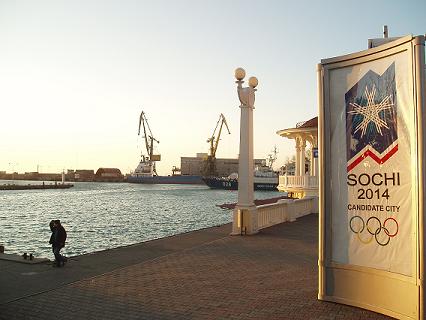Want to see more blogs like this? Change the environmental conversation and chip in to support rabble.ca.
A quarry near the village of Sochi, Russia that had been used as a source of materials for the construction of venues and luxury hotels for the 2014 Winter Olympics is now a gigantic landfill site for construction waste related to the Games. It is located near the Mzymta River in a water protection zone where the dumping of industrial waste is banned.
In February 2012, the group Environmental Watch on North Caucasus reported, “Officials in Sochi’s Krasnodar region met with Russia’s natural resources and environment minister late last year and decided to move a controversial waste landfill to the mountains of Sochi, right near several sites of drinking water intake that feed half of the city’s population….The new location is a former quarry near the village of Galitsino, which lies near the Mzymta river in the southern part of Sochi.”
They also noted, “The Kamensky quarry has been used as a source of construction materials for the development of Olympic venues….The Kamensky quarry lies in the porous limestone topography right next to two active sites of water intake. According to the Sochi city plan, this area falls into the sanitary protection zone of Mzymta river underground water reservoir. The reservoir, which stretches along the river and provides water for the majority of Sochi’s population.”
This week, Human Rights Watch stated, “In 2008 the authorities paved a dirt road running through the village (Akhshtyr, which is situated between the Olympic venues on Sochi’s Black Sea coast and the alpine Olympic venues in the resort of Krasnaya Polyana) to facilitate truck access to two quarries, and to a construction waste dump that they had built above the village and used for Olympic construction, and in the process destroyed residents’ main drinking water wells.”
The organization also said, “In response to residents’ complaints, authorities have delivered drinking water to the village by truck about once per week, and sometimes less regularly. Residents told Human Rights Watch that the amount of water provided is not sufficient for their household needs, especially in the summer when they must water their gardens, which provide food both for household consumption and to be sold for income. In November 2010 Russian authorities installed a water pump on the edge of the village. According to residents, the pump worked only on the day when a number of local officials came to the village for a public event celebrating the pump’s installation. The authorities later stated in letters to Akhshtyr residents that the pump had been shut off because it did not meet ‘sanitary-protection norms.'”
The Independent adds, “The Russian water code prohibits the dumping of waste and soil in this area, since it could contaminate the river Mzymta, which provides a large part of Sochi’s water supply. After Environmental Watch on North Caucasus and other local environmental organisations filed a complaint, Russia’s Environmental Protection Agency fined the country’s railway monopoly, Russian Railways, which is carrying out much of the Olympic construction, £1,800 for illegal dumping at the larger of the sites. But the relatively paltry fine did not stop the operation.”
The newspaper also highlights, “Since the end of October, police have detained three activists with Environmental Watch on North Caucasus….Over the past year, law enforcement actions against Sochi area environmentalists have become ‘more frequent and harsh’, said human rights lawyer Alexander Popkov.”
Human Rights Watch points out that the International Olympics Committee has been unhelpful on these issues. “Beginning in 2009 Human Rights Watch has repeatedly informed the International Olympic Committee (IOC) about the water supply and other concerns in Akhshtyr in meetings, in letters, and during a joint visit to the village in September 2013. The IOC has shared this information with the Sochi 2014 Organizing Committee, which repeatedly sent assurances that the water supply problem had been resolved, or would soon be resolved – even when it had not. The IOC has told Human Rights Watch that it did not seek to independently verify the information provided by the authorities.”
The Sochi 2014 Winter Olympics take place February 7-23.
In 2010, the Council of Canadians raised numerous concerns about the Winter Olympics in Whistler/ Vancouver, including the Games being held on unceded First Nations territories, corporate sponsorship by Coca-Cola, the use of public funds better spent on meeting public needs, the failure of the Harper government to respect a United Nations call for a truce in Afghanistan during the Games, and the damage done by the Sea-to-Sky highway expansion between Vancouver and Whistler.
Image: wikimedia commons



